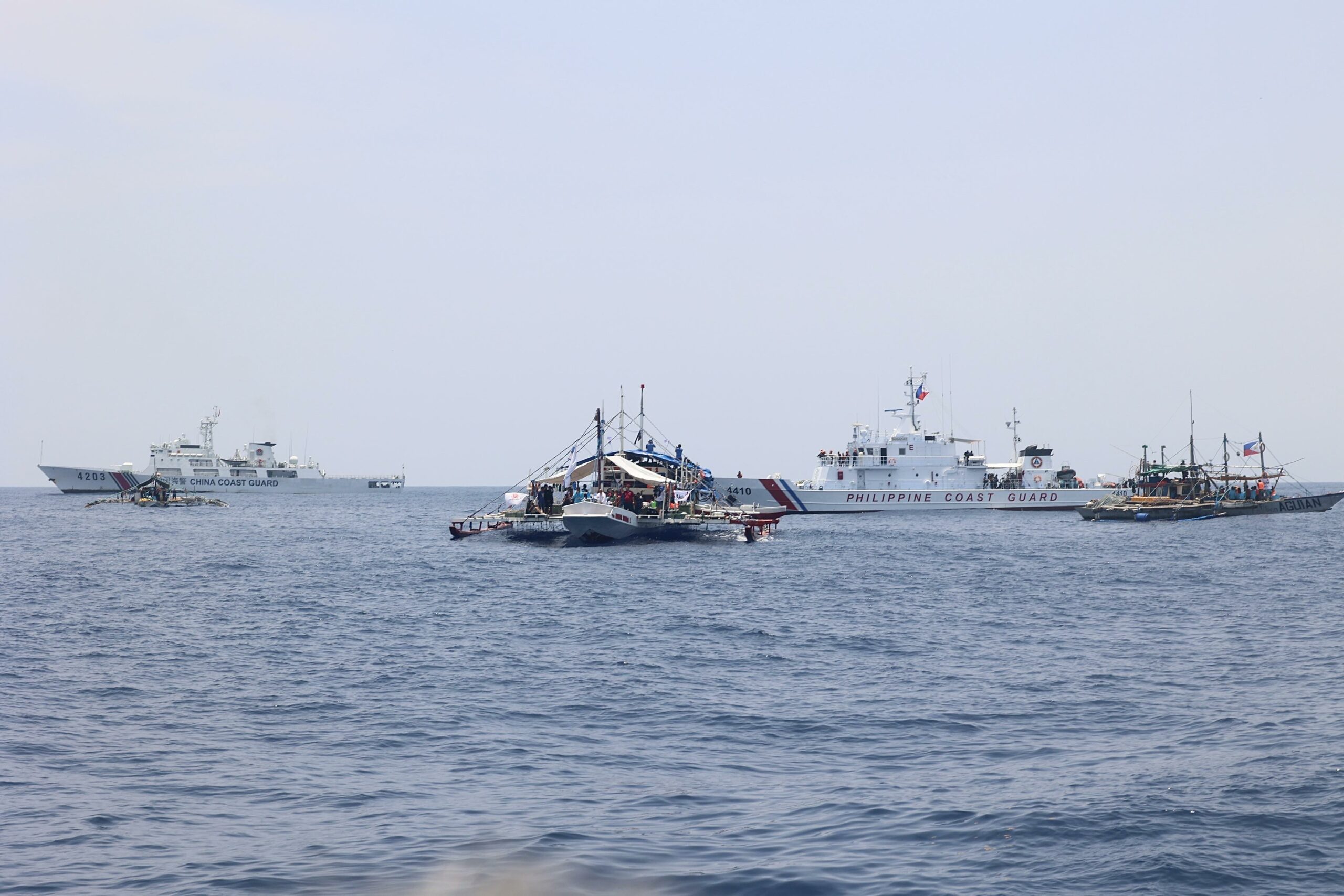Filipino activists fail to sail closer to Scarborough Shoal, avoid China clash

A CIVILIAN flotilla of Filipino activists on Thursday failed to sail closer to a disputed shoal in the South China Sea, avoiding a clash with dozens of Chinese Coast Guard and militia vessels patrolling the area.
Still, the Atin Ito civic coalition in a statement called its mission to Scarborough Shoal a success after it managed to distribute food packs and about 1,000 liters of fuel to Filipino fishermen.
Akbayan Party President and Atin Ito convenor Rafaela David, who was part of a 10-man team that sailed a day earlier, said they had managed to breach China’s “illegal blockade.” “Mission accomplished.”
The main convoy was composed of at least four commercial fishing boats carrying more than 100 volunteers, journalists and fishermen, Emmanuel Hizon, one of the organizers, said by telephone. They were accompanied by about 100 fishermen on wooden boats on the first leg of the mission.
“This stands as a testament to the ingenuity, resourcefulness and bravery of the Filipino spirit amidst formidable challenges,” she added.
China said on Wednesday it has sovereignty over the shoal, which it calls Huangyan Island, and its adjacent waters.
The advance team went as near as 25 nautical miles (46 kilometers) from Scarborough Shoal, a triangle-shaped atoll with a vast fishing lagoon that China seized in 2012 after a tense standoff with Philippine ships, on May 15.
“China may possess larger and more vessels and wield strong water cannons, but we possess a secret weapon: our diskarteng Pinoy (Filipino strategy) which, when coupled with determination and love for fellow citizens and country, can surmount even the most daunting adversity,” Ms. David said.
Joshua Bernard B. Espeña, vice president of Manila-based International Development and Security Cooperation, said the civilian mission fills the void left by the government in defending the country’s claims in the waterway.
“Politicians should not hype these activities and put civilians in harm’s way,” he said in a Facebook Messenger chat. “Instead, these activities by civil society should serve as a signal for them to strengthen the country’s defense capabilities.”
The Philippines sent three coast guard vessels to ensure the safety of the civilian flotilla during the mission. About 100 smaller wooden fishing boats joined the initial part of the trip.
A Philippine Coast Guard aircraft was also deployed to monitor the situation at Scarborough Shoal, where Manila and Beijing have been embroiled in heated standoffs over competing claims, it said on Tuesday.
Chinese state broadcaster CCTV reported that the Chinese Coast Guard recently held routine drills at the shoal.
The main Atin Ito convoy did not proceed to the shoal after learning that their advance team had handed out fishing supplies and after a report that Filipino fishers in the area had been driven away by Chinese vessels.
The group got information that “most, if not all, Filipino fishermen had been driven away,” Mr. Hizon said.
“Upon learning that the advance team was able to conduct an effective supply run for fishers in Scarborough, the general assessment of the main mission was that the objective of getting to the vicinity of the shoal was already achieved,” he added.
‘ALIGNMENT OF INTERESTS’
The main convoy only managed to reach 50 nautical miles from the shoal, while about 40 Chinese vessels were positioned 40 nautical miles from it, Mr. Hizon said.
He said the main convoy was set to go to a fish port in Subic, Olongapo City to conclude the mission.
“The Atin Ito mission highlights not only the maritime security in the West Philippine Sea but also the most critical issue of food security and sustainability,” said Gary Ador Dionisio, dean of De La Salle–College of Saint Benilde School of Diplomacy and Governance.
“The negligence of the past administration to assert our rights in the Philippines exclusive economic zone resulted in the decimation of both our territorial and food security claims,” he said in a Facebook Messenger chat.
Former President Rodrigo R. Duterte led a pivot to China when he came to office in 2016 in exchange for investment pledges, few of which materialized.
“The Atin Ito campaign is an important facet in strengthening people’s awareness of the issues in the West Philippine Sea, including its role in the country’s food security, not only national sovereignty,” said Randy P. Tuaño, dean of the Ateneo de Manila University School of Government.
“By highlighting the ecological and economic significance of this region, the campaign educates the public about the critical marine resources that sustain local fisheries and support livelihoods,” he said via Messenger chat.
Don Mclain Gill, an international relations lecturer at De La Salle University, said the civilian mission illustrates the “alignment of interests between the government and the public toward exercising sovereignty and sovereign rights” within its exclusive economic zone.
“However, such undertaking must be planned thoroughly beforehand with the Philippine defense sector to ensure the feasibility of future missions,” he said via Messenger chat.
Mr. Hizon said Atin Ito aims to normalize civilian missions in the face of China’s growing aggression.
Philippine lawmakers hailed the civilian mission.
Senator Jose Pimentel “Jinggoy” Ejercito, Jr., who heads the Senate defense committee, said it reflects ordinary Filipinos’ love for country.
Manila Rep. Bienvenido M. Abante, Jr. said he wanted to invite some congressmen to go with him to the South China Sea.
Filipinos should condemn China’s bullying at sea, he said in a statement. “We are just a pawn in the motive of China to control international trade because more than 60% of all trade pass through [that sea].”
Atin Ito led a similar mission in December to deliver supplies to troops stationed at Second Thomas Shoal, but it cut short its journey due to what it described as shadowing and harassment by Chinese Coast Guard ships.
China claims almost all the South China Sea, including parts claimed by the Philippines, Brunei, Malaysia, Taiwan and Vietnam.
A United Nations-backed tribunal based in the Hague in 2016 voided China’s sweeping claims in the South China Sea for being illegal. — Kyle Aristophere T. Atienza



